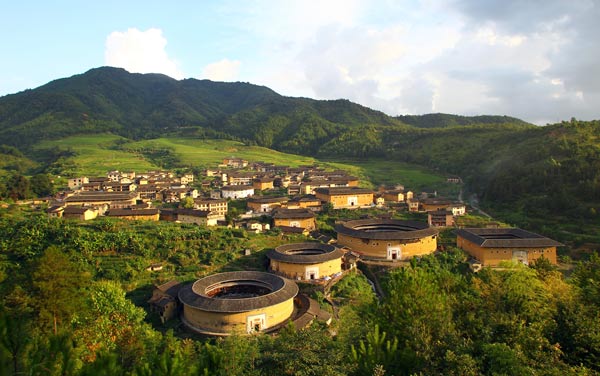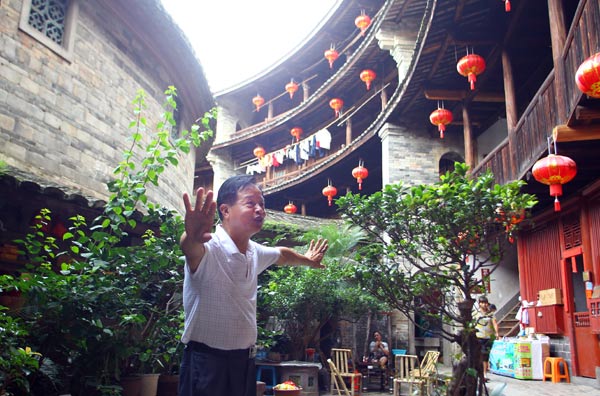 |
|
A bird’s eye view of tulou in Yongding county, Fujian province. PHOTO BY ZOU HONG / CHINA DAILY
|
Complexes are architectural wonders that attract tourists, He Na and Hu Meidong report from Yongding county in Fujian.
An old story still raises a chuckle among tulou residents in Longyan, Fujian province.
It goes like this: Satellite images of tulou clusters once made some countries nervous because they thought the giant mushroomlike structures resembled nuclear shelters and they feared the complex was a Chinese missile base.
Those doubts were quickly dispelled when visitors arrived at the site soon after China began its reform and opening-up policy in the late 1970s.
 |
|
Lin Rigeng, a tulou owner in Yongding county, Fujian province, introduces visitors to the ancient dwelling complex. PHOTO BY ZOU HONG / CHINA DAILY
|
Literally "earthen structures", a tulou typically comprises an earthen outer wall and an internal wooden framework. The circular design usually surrounds a central shrine, and several hundred people live in a single complex.
Tulou are dwellings in the mountainous areas of southeastern Fujian that date back to the 12th century. They are designed to house large communities and to serve as a defense against invasion. The large structures have survived wars and natural disasters.
There are about 23,000 tulou in Yongding county and about 15,000 in Nanjing county.
Lin Rigeng, 63, one of the owners of Zhencheng Lou in Hongkeng village, recalled that until the early 1990s there was no road linking the village to the outside world and few villagers had even seen a bicycle.
According to Lin, who is also known as the Prince of the Hakka Tulou, what is now a 10-minute drive to Hukeng town used to be a half-day walk along the zigzagging mountain roads.
"Even so, back then there were some backpackers from both China and abroad who came a long way just to take a close look at, and live in our tulou for a couple of nights," he said.
"We Hakka people are hospitable. In the olden days, when visitors came we welcomed them warmly with free tea, food and accommodation."
We recommend:
